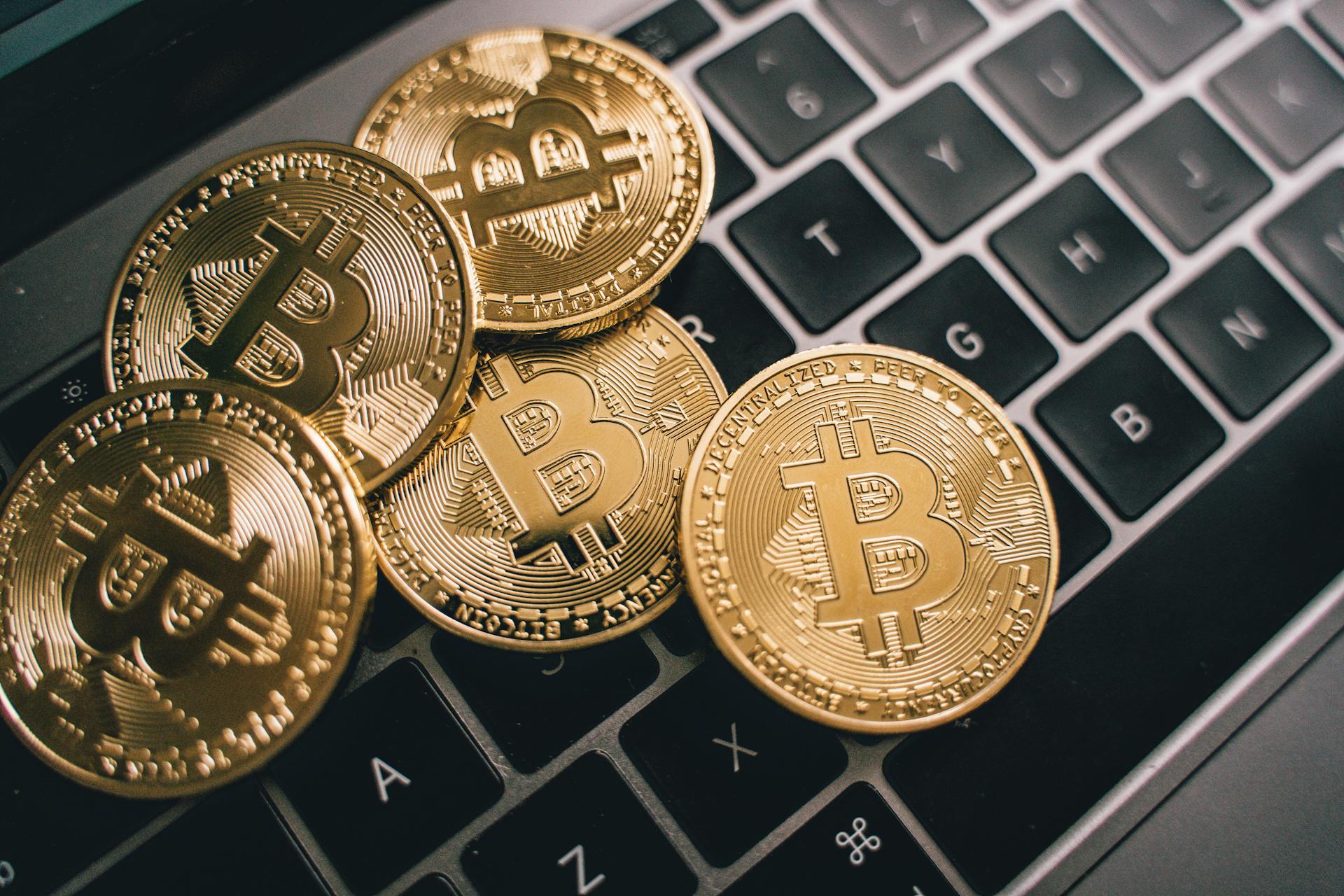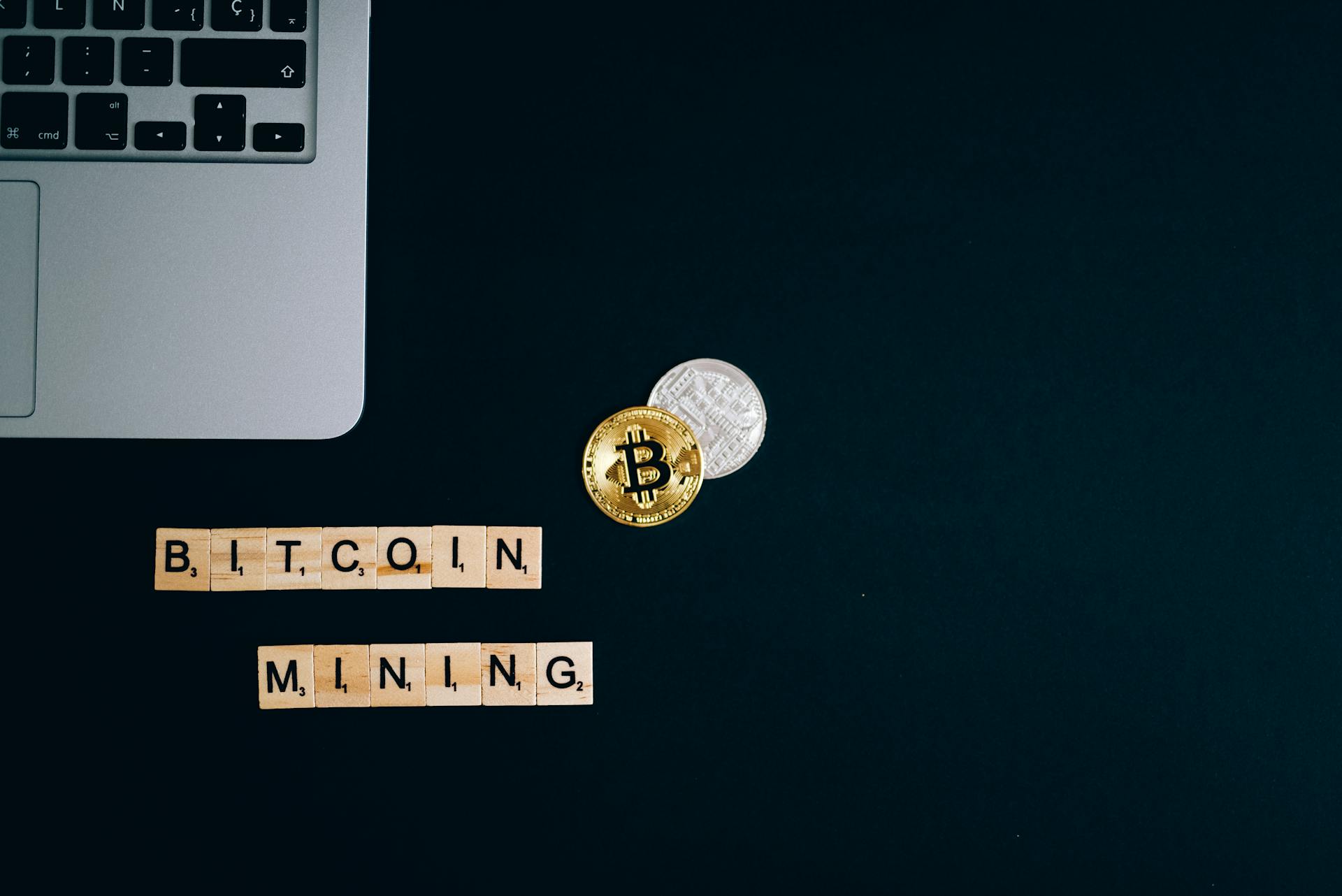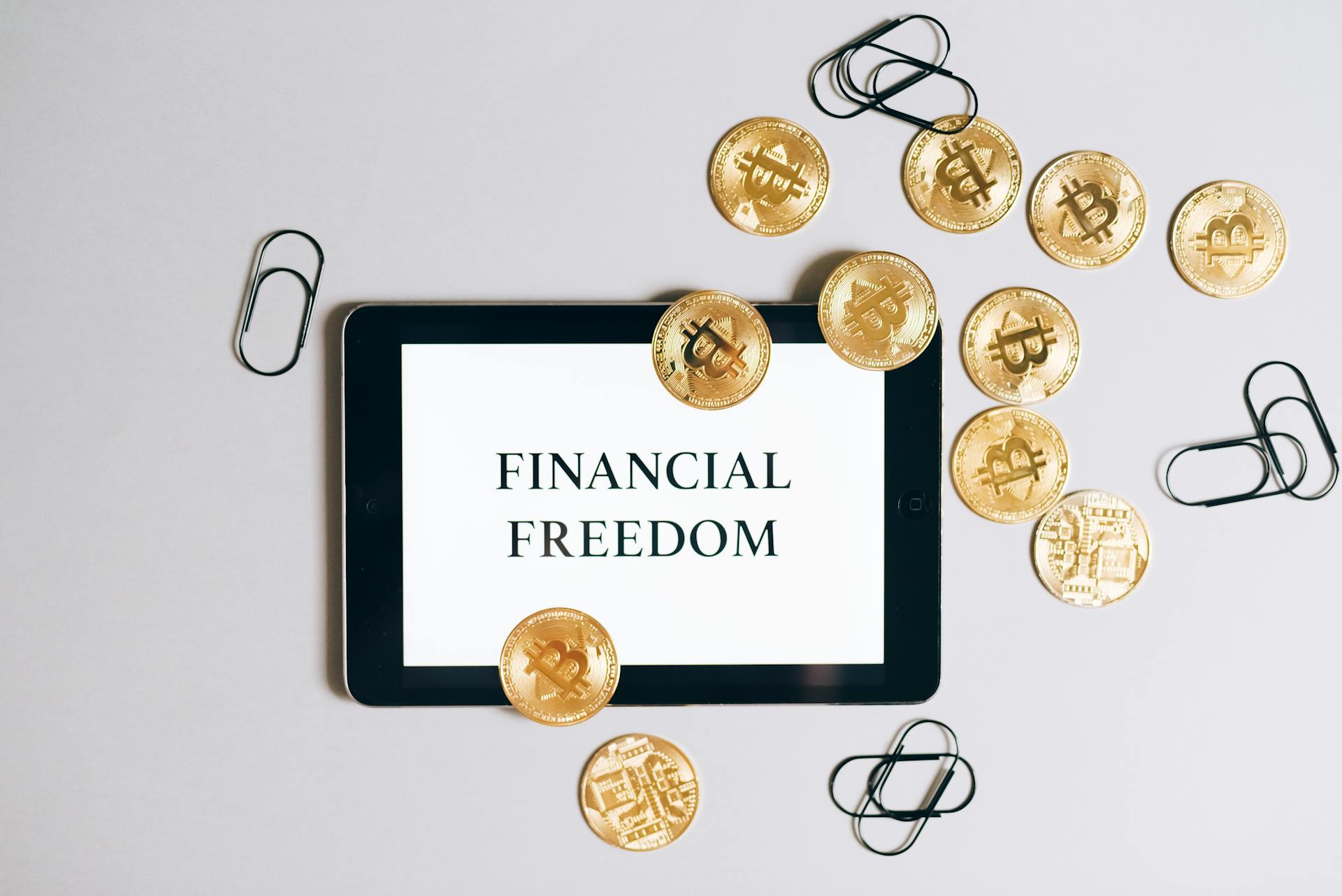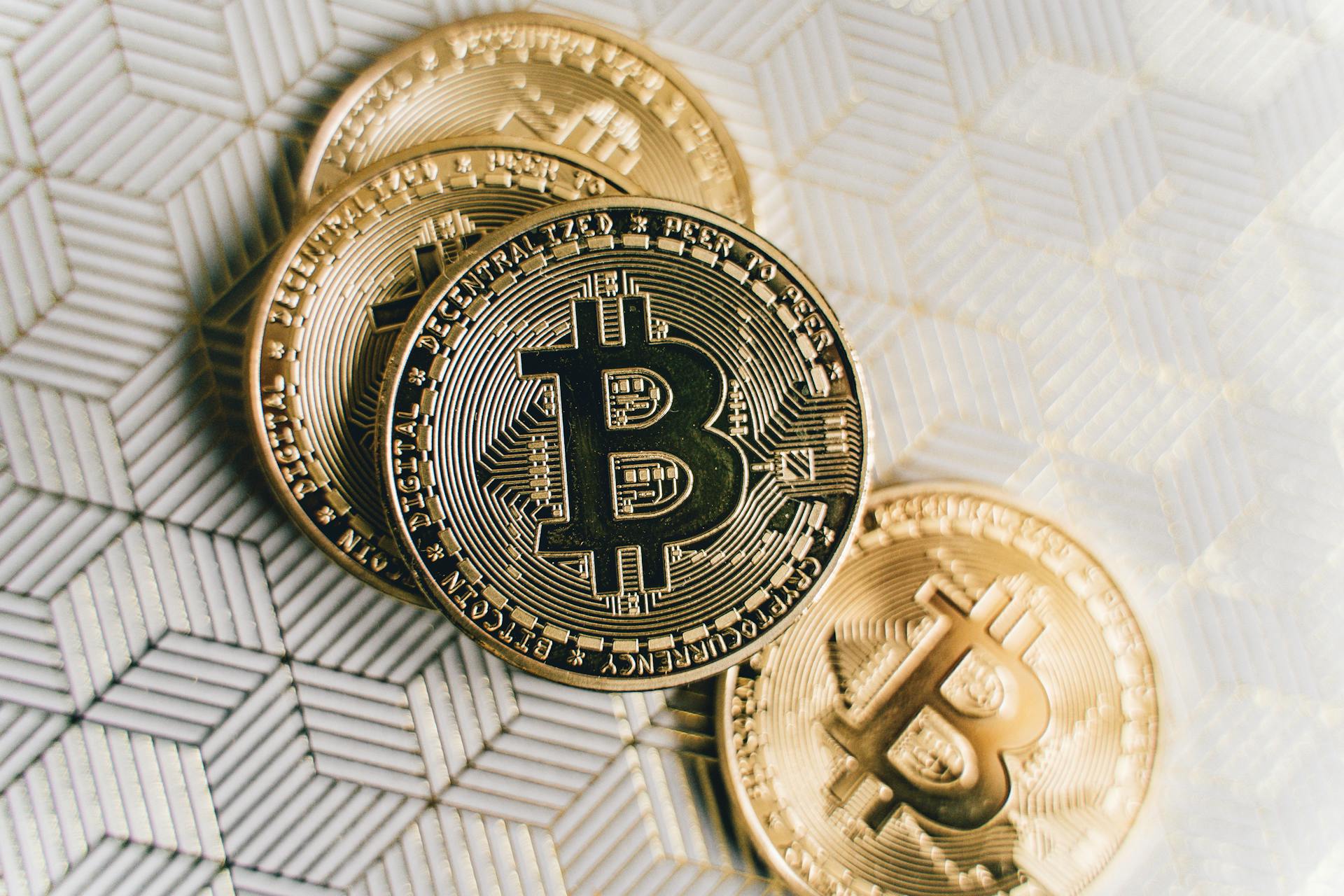
Investing in and holding Bitcoins can be a bit of a gamble, but it's not entirely without its merits. The decentralized nature of Bitcoin makes it a potentially attractive option for those looking to diversify their portfolios.
One of the biggest concerns with Bitcoin is its volatility, which can be seen in its price fluctuations. For example, in 2017, the price of Bitcoin skyrocketed from around $1,000 to nearly $20,000 in a matter of months.
However, despite its volatility, Bitcoin has proven to be a resilient asset class. In fact, a study found that Bitcoin's price has been increasing steadily over the past decade, with a compound annual growth rate of around 100%.
But what about security? Is it safe to hold Bitcoins? The answer is a bit more complicated than a simple yes or no.
Recommended read: How Much Did Bitcoins Cost Originally
Bitcoin Security
Bitcoin security is a top priority for anyone looking to invest in this cryptocurrency. Unlike traditional financial systems, Bitcoin operates on a decentralized network without intermediaries like banks or payment processors.
Your private keys are the most critical aspect of Bitcoin security, used to sign transactions and prove ownership of your Bitcoins. If someone gains access to your private keys, they can steal your Bitcoins.
Never share your private keys with anyone, as they are meant to be kept secret and secure. Use cold storage, such as a hardware wallet or paper wallet, to keep your private keys offline and reduce the risk of cyber threats.
Regularly back up your private keys and store the backups in secure locations, such as a safe deposit box or encrypted USB drive. This ensures that you can recover your funds if your primary wallet is lost or damaged.
Security features are the backbone of any safe crypto exchange, and you should look for platforms that employ advanced encryption, two-factor authentication (2FA), and cold storage for funds. These measures help protect your assets from potential threats.
To further enhance your crypto trading experience, enable two-factor authentication (2FA) on your exchange accounts, use strong and unique passwords, and avoid sharing sensitive information. Consider using hardware wallets for storing your assets, as they provide an extra layer of security.
For your interest: How to Use Bitcoins
While the security of cryptocurrencies can vary, Bitcoin is often regarded as the most secure due to its robust network and widespread adoption. Bitcoin's blockchain is secured by a vast network of miners, making it highly resistant to attacks.
Here are some essential security measures to keep your Bitcoins safe:
- Never share your private keys
- Use cold storage
- Create backups
- Enable two-factor authentication (2FA)
- Use strong and unique passwords
- Consider using hardware wallets
Choosing a Wallet
Choosing a wallet is a crucial decision when it comes to storing your Bitcoins safely. You have several options, including hardware wallets, software wallets, and paper wallets.
Hardware wallets are highly secure because they store your private keys offline, making them immune to online hacking attempts. They can be costly, but they offer a high level of security. Popular hardware wallets include the Ledger Nano S, Ledger Nano X, and Trezor Model T.
Software wallets, on the other hand, store your private keys on your computer or mobile device. They are convenient for everyday transactions, but they are more vulnerable to hacking and malware attacks. Some popular software wallets include Electrum, Exodus, and Mycelium.
Paper wallets are a physical document that contains your private and public keys. They are generated offline and printed, offering a high level of security. However, they can be easily lost, damaged, or stolen.
Here's a brief comparison of the three types of wallets:
Ultimately, the best wallet for you will depend on your specific needs and preferences. It's essential to do your research and choose a wallet that balances security, convenience, and cost.
Choosing a Wallet
Choosing a wallet is one of the most important decisions you'll make regarding the security of your assets.
Hardware wallets are physical devices that store your private keys offline, making them highly secure because they are disconnected from the internet. They can be costly, and you must keep the physical device safe, but they are a great option for long-term storage.
Popular hardware wallets include the Ledger Nano S, Ledger Nano X, and Trezor Model T. These wallets are highly regarded for their security features and ease of use.
Worth a look: Crypto Exchange Security
Software wallets, on the other hand, are applications or programs that store your private keys on your computer or mobile device. They are convenient for everyday transactions, but since they are connected to the internet, they are more vulnerable to hacking and malware attacks.
Here are some popular software wallets: Electrum, Exodus, and Mycelium. Keep in mind that software wallets are not as secure as hardware wallets, but they are still a good option for small amounts of cryptocurrency.
A paper wallet is a physical document that contains your private and public keys. It is generated offline and printed, offering a high level of security. However, paper wallets can be easily lost, damaged, or stolen, so it's essential to keep them safe.
To create a paper wallet, you can use a reputable website like bitaddress.org to generate your keys offline and print them securely. Paper wallets are a good option for long-term storage, but they require more effort to set up and use.
In general, it's recommended to store the bulk of your cryptocurrency in a cold wallet, such as a hardware wallet, and use a hot wallet for smaller amounts of cryptocurrency that you want available for trading.
Check this out: Difference between Bitcoin and Cryptocurrency
Here are some key considerations when choosing a wallet:
Remember, the security of your cryptocurrency is in your hands, so choose a wallet that fits your needs and take the necessary steps to keep it safe.
Payment Methods
Having a variety of payment methods is a strong indicator of a safe exchange.
Trusted platforms typically offer bank transfers, credit cards, and even crypto deposits to enhance user convenience and signal reliability. This flexibility is a clear sign that the platform is trustworthy and willing to accommodate different user needs.
The availability of multiple payment options also suggests that the platform is serious about providing a secure and user-friendly experience.
User Interface
A user-friendly interface is essential for a safe and efficient trading experience. It should provide intuitive navigation, clear instructions, and easy-to-understand tools, allowing traders to focus on their strategies rather than struggling with the platform's layout.
A seamless user experience across different devices is also crucial, ensuring that you can trade securely wherever you are. This is especially important for crypto traders who need to stay on top of their trades at all times.
A safe exchange should be easy to use, and its user interface should be accessible in your region. This means that you should be able to access your account and trade with ease, regardless of your location.
Intriguing read: How Do You Trade in Bitcoins
Exchange Security
Choosing a safe crypto exchange is crucial for protecting your Bitcoin holdings. Look for platforms that employ advanced encryption, two-factor authentication (2FA), and cold storage for funds.
Robust security measures are the backbone of any safe crypto exchange. Advanced encryption protects your assets from potential threats, ensuring your trading experience is as secure as possible.
Two-factor authentication (2FA) is a must-have feature for any crypto exchange. It adds an extra layer of security to your account, making it much harder for hackers to gain unauthorized access.
Consider user accessibility, payment methods, and customer support when selecting a crypto exchange. These factors can ensure a secure and smooth trading experience.
To enhance your security, create unique, strong passwords and activate all available safety features on your account. Stay alert to potential phishing attempts by safeguarding your login credentials and private keys.
Here are some key elements to consider when assessing the safety of a crypto exchange:
- Encryption technologies
- Multi-factor authentication
- Cold storage options to protect user funds
- Compliance with industry regulations
- Certifications from relevant financial bodies
Regularly auditing your account for any irregularities and conducting regular security checks can help prevent unauthorized access to your account.
Exchange Best Practices
To ensure a safe and secure trading experience, it's essential to follow best practices when using a crypto exchange. This includes enabling two-factor authentication (2FA) on your account, using strong and unique passwords, and avoiding sharing sensitive information.
Regular audits and transparency are also crucial indicators of a safe and trustworthy exchange. Look for platforms that subject themselves to frequent third-party audits, which verify their financial stability, security protocols, and overall operational integrity.
To enhance your security, consider using a VPN when accessing a crypto exchange from unsecured or public networks. A VPN encrypts your internet connection, making it harder for hackers to intercept your data or track your online activity. By following these best practices, you can significantly reduce the risk of unauthorized access and keep your crypto assets secure.
Here are some key security features to look for in a safe crypto exchange:
- Advanced encryption
- Two-factor authentication (2FA)
- Cold storage for funds
By prioritizing security and following best practices, you can have confidence in the safety and reliability of your chosen platform.
Regular Audits and Transparency
Regular audits and transparency are essential indicators of a safe and trustworthy exchange. They serve to verify the exchange's financial stability, security protocols, and overall operational integrity.
Exchanges that subject themselves to frequent third-party audits demonstrate a commitment to transparency and accountability. These audits can help identify and rectify potential vulnerabilities before they become serious issues.
By openly publishing audit results and financial reports, exchanges demonstrate transparency and allow users to see exactly how their funds are being managed and protected. This openness builds trust and empowers traders to make informed decisions.
Regular audits can also help exchanges stay ahead of potential security threats and ensure that they are adhering to industry best practices. This is crucial for maintaining a secure and reliable trading environment.
In the event of a hack or security breach, insured exchanges may compensate users for their losses, reducing the financial risk associated with trading on the platform. However, not all types of assets or accounts may be covered.
Additional reading: Bitcoin Lightning Exchanges
Exchanges that prioritize transparency and regular audits are more likely to have a secure and trustworthy reputation. This is reflected in their ability to maintain a strong and loyal user base.
By choosing an exchange that prioritizes transparency and regular audits, traders can confidently navigate the world of crypto trading. This is especially important for protecting assets and minimizing the risk of asset loss.
Secure Trading Best Practices
Secure trading best practices are essential for protecting your investments and ensuring a smooth trading experience. Focus on robust security measures, a reputable track record, and transparent fee structures when selecting a crypto exchange.
Enable two-factor authentication (2FA) on your exchange accounts to add an extra layer of security. Use strong and unique passwords, and avoid sharing sensitive information. Consider using hardware wallets for storing your assets, as they provide an additional layer of security.
Regulatory compliance is crucial for ensuring the safety of a crypto exchange. Exchanges that adhere to regulations are often required to implement stronger security measures, perform regular audits, and maintain transparency.
For your interest: Crypto Wallet Security
The safest exchanges employ various risk management strategies to handle market volatility. These include implementing circuit breakers during extreme price swings and offering stablecoin trading pairs. This helps protect traders from sudden losses and ensures smoother trading experiences.
Using a VPN (Virtual Private Network) is recommended for added security, especially when accessing a crypto exchange from unsecured or public networks. A VPN encrypts your internet connection, making it harder for hackers to intercept your data or track your online activity.
A recovery plan is essential for a safe crypto exchange, outlining the steps the platform will take in the event of a security breach or system failure. This plan often includes backup protocols, disaster recovery processes, and customer compensation strategies.
The safest exchanges implement multiple layers of protection against phishing attacks. These include educating users about common scams, using secure login methods like 2FA, and ensuring their official communications are easily distinguishable from fraudulent ones.
Here are some best practices for storing cryptocurrencies:
- Store the bulk of your crypto in a cold wallet since that's the most secure option.
- Use a hot wallet for smaller amounts of crypto that you want available for trading.
- Physically record the recovery phrases for your crypto wallets.
- Save recovery phrases in a secure location that only you can access.
- Never share your crypto wallet's recovery phrase or private keys with anyone.
Implementing strong security measures is essential to safeguarding your investment in cryptocurrencies. This includes using advanced encryption, two-factor authentication (2FA), and cold storage for funds.
Sources
- https://www.pelicoin.com/blog/2024/9/11/how-to-keep-my-bitcoins-safe
- https://portal.ct.gov/dob/consumer/consumer-education/cryptocurrency-risks
- https://www.bitcoin.com/exchanges/safest/
- https://www.fool.com/investing/stock-market/market-sectors/financials/cryptocurrency-stocks/how-to-store-cryptocurrency/
- https://www.nerdwallet.com/article/investing/is-bitcoin-safe
Featured Images: pexels.com


